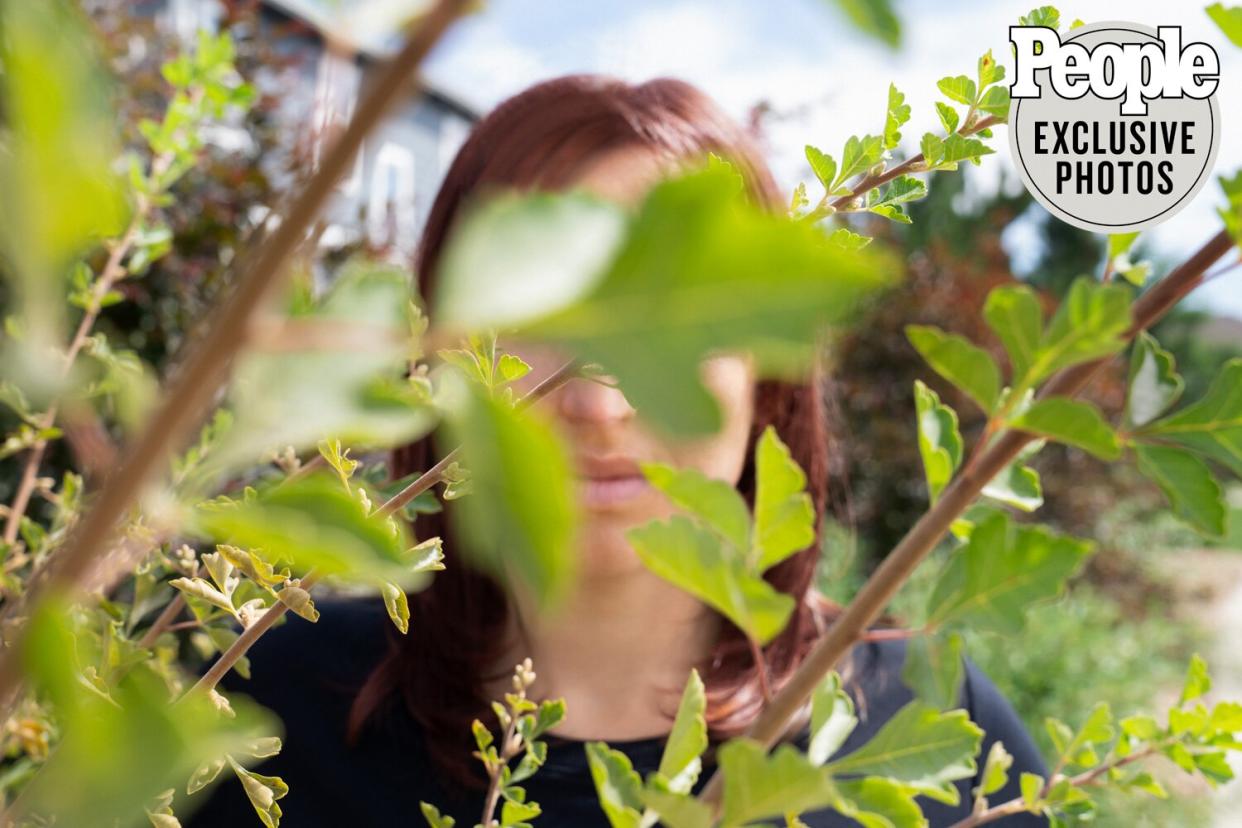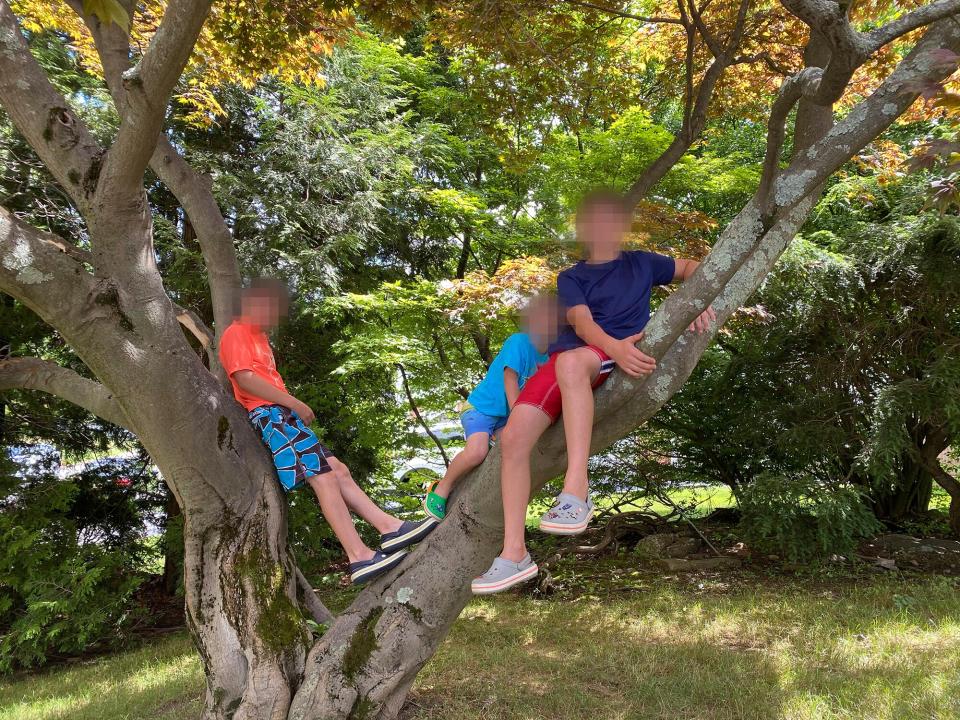When a Child Sexually Abuses a Sibling: a Mother's Story

Chloe Aftel After she discovered her son had sexually abused his brothers, Hope [pictured, hidden to protect her family's identity] and her family have been struggling to heal
Experts believe sexual abuse by a sibling, known as sibling sexual abuse or SSA, is the most common form of sexual abuse in the home — it is thought to occur at least three times more frequently than sexual abuse by a parent. But it's rarely discussed and rarely reported. Two years ago, Hope (a pseudonym), a mother of three boys, discovered that her oldest son was abusing her younger two sons. Here, she shares her story.
One October night in 2020, Hope, a 40-year-old mother of three, went to check on her two oldest boys to make sure they were getting ready for bed. She found her 13-year-old under his covers while her 10-year-old was standing across the room in his bathrobe — but something about the scene didn't seem right. "I felt it in the pit of my stomach," Hope tells PEOPLE in this week's issue.
She brought her 10-year-old to her room and gently questioned him. "Finally, he said his brother had been touching his private parts, and he had been touching his brother's private parts," she says. "At the time, we didn't have a clue of the severity of what went on."
Later Hope and her husband learned the awful truth: Their eldest had been sexually abusing their middle son for about a year. "I thought it was a game brothers play," her middle son told them. The revelation shattered the family.
"It's easy to point to an adult abuser of a child and say, 'You're a monster.' But my child who did this is not a monster. I gave birth to him, raised him," says Hope. "I felt I had two sick children in dire need of help in very different ways."
The morning after her devastating discovery, Hope made therapy appointments for the two boys. She realized the therapists would be legally obligated to report the abuse, "but I knew it needed to be done."
Days later, a child protective service officer came to their home. "I couldn't help but say to them, 'We're a normal family!' We were two educated parents, good jobs, no family trauma. The only time I'd seen something like this happen was in the movies."
Police interviewed their younger son, as well as their third and youngest child, then just 6, who was so scared that he urinated during the questioning. They soon learned that he too had suffered abuse.
RELATED: Sibling Sexual Abuse: An Expert on What to Know
How could the family's oldest, a boy who had not so long ago loved Legos and Power Rangers, have molested his brothers? "We asked him, 'Has anybody done this to you?'" says Hope. His answer: no. He later said that an age-appropriate YouTube tutorial he came across when he was 8 led him to sexually explicit content on the dark web, where he got the ideas.
"I was under that naive thinking of 'My kids would never look at stuff like that,'" says Hope. "But those videos became real-life curiosities. And rather than coming to us with questions, he tried things out with his brother, who adores and trusts him."
After questioning their oldest, police told Hope and her husband they needed to remove him from the home immediately. "The five of us stood in the living room crying and hugging, my boys saying goodbye to each other, none of us understanding what would happen next," Hope says. "My husband went to a hotel with my oldest, and I fell to the floor with my two other boys, sobbing."
Desperate for support, Hope went online in search of families in similar situations. "All I wanted was to speak to one person. To know one mom who could say to me, 'I've been in your shoes. I understand,'" she says. "But there was nothing. The feeling of isolation was so intense it was suffocating."
Hope decided to start her own Facebook page for parents coping with SSA, and eventually she connected with Jane Epstein, an adult survivor of SSA who has become an outspoken activist. Together they, along with three other women, all SSA survivors or mothers, founded 5Waves.org, a website that provides support and education to families facing SSA.
"We all thought we were the only ones going through this," says Epstein. "Now, we don't want another person to feel alone."
For Hope's family, the pain is still very present. "There are moments when helping one child feels like a betrayal of the other child, and vice versa, because the type of attention, support and love they need are so different," she says.Her oldest underwent an 18-month long treatment program at a facility in another state, one of only a handful of programs available in this country that focus on SSA — Hope and her husband had to take out a home equity loan to pay for it.
Authorities did not press charges against the boy with the stipulation that he would complete the program. He did so earlier this year and, after undergoing a psychosexual evaluation was found to be at a very low risk for re-offending.
As sibling survivors, her two youngest sons have wrestled with complicated feelings: "My middle son has tremendous guilt: 'It's my fault my brother went away. I miss him,'" Hope says. Throughout that program, her sons were unable to see one another in person, but as part of his treatment, her oldest read a letter to her middle son over Zoom.
"He took accountability for every detailed thing that happened between the two of them and said things like, 'None of this is your fault. You didn't do anything. I'm glad you told Mom and Dad. I'm glad I'm getting help. I love you. I understand if you never trust me again. I will never hurt you again,'" Hope says. He did a similar call afterward with the youngest brother.

Courtesy Hope Sittler Hope's three sons in 2018.
For now, the family is still living apart: The oldest is at a small boarding school in the southeast for students with high-functioning autism. (He was diagnosed with the condition last year.) The school, which is aware of his past, has helped facilitate outside therapy to continue his treatment for sexual maladaptive behaviors, another measure the family is taking to prevent future abuse. According to experts, if treated properly, 95 to 98 percent of children who commit SSA do not offend again.
Each week, the family has Zoom calls together when the boys play Uno or Scrabble: "My younger boys have fears and anxieties about their brother, but the love seems to be trumping that. They ask when they can talk to him and if he is coming home."
One day Hope wants to tell them yes. "There's a deep desire to have our family back together, when it is safe and when the time is right," she says. Until then, she wants to help end the stigma that keeps other families from facing SSA. "We want to bring it out of the shadows so eventually the world will know how to respond."
For more information on how to recognize Sibling Sexual Abuse and for support if your family is affected, go to: Sibling Sexual Trauma.com

